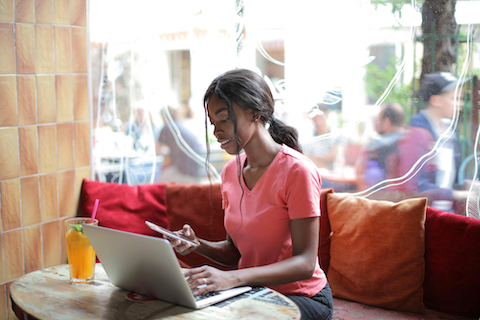Innovations for Educational Resilience

Covid-19 has had a significant impact on education and training. If we want to build resilient education systems, issues of learning loss due to school closures and lack of access to technology for teaching and learning need to be addressed. A gender-sensitive system focusing on the social, emotional, and economic contexts of learners is required. Additional support for vulnerable groups, such as persons with disabilities and girls who have faced additional challenges, is needed to bring them back to school.
The pandemic has underscored yet again the importance of technology and open, distance, and online learning for providing access to quality education. During lockdowns, teachers, educational institutions, and governments used many innovative approaches to reach learners. A comprehensive body of knowledge and experiences on what worked and what did not has been gathered.
Some of the questions that have emerged are the following:
- How can governments and institutions scale up teaching and learning to make up for the learning loss and strengthen education?
- How can institutions build systems and processes for lifelong learning that are financially sustainable to educate and skill a large number of people? What can civil society do to prepare citizens to meet the challenges of the 21st Century?
- What else needs to be done to create a sustainable educational infrastructure that is resilient in the face of pandemics, unrest and natural disasters?
PCF10 will be a platform for reflections and discussions on reimagining education systems to foster lifelong learning and empower people to make life choices and improve their livelihoods. Such systems will be based on innovative uses of technology for teaching and learning, and ethical practices for equity and inclusion. We welcome stakeholders across the globe, and particularly in the Commonwealth, to join PCF10 to discuss, debate, and showcase how innovations can develop resilience in our education systems.
PCF10 will focus on many contemporary issues, such as skilling youth, mainstreaming gender, providing equal opportunities for persons with disabilities, and supporting learning for sustainable development. In addition, PCF10 will be a platform for ministers of education, government officials, academics, teachers, administrators, and representatives of civil societies to develop a roadmap to rebuild our education systems and make them resilient to future shocks.
Sub-themes
Within the Forum’s main theme, the sub-themes cover a wide range of areas that are of interest to COL’s stakeholders. The Forum will address issues and challenges in formal, non-formal, and informal learning, reflecting a spectrum of ideas from policy interventions to practical innovations to build resilience and supporting the achievement of the United Nations Sustainable Development Goal 4 (SDG4): Ensure inclusive and equitable quality education and promote lifelong learning opportunities for all by 2030.
Presentations would be grouped around four sub-themes that are inter-twined around three critical strands of quality, technology, and capacity:
- building resilience
- fostering lifelong learning
- inspiring innovations, and
- promoting equity and inclusion.
In each of the sub-themes, there will be a special focus on educating girls and emerging technologies for education and training (e.g., applications of artificial intelligence, augmented reality/virtual reality, and robotics).
Building resilience
Disruptions, such as pandemics, internal and external wars and displacements, and natural disasters often linked to climate change, have stressed the education systems around the globe. This sub-theme will focus on the economic, political, and cultural aspects of educational disruption and ways to build resilience. Expected areas to be covered under this sub-theme include the following:
- education financing,
- supply and demand mismatch in educational provisions, and
- costs of investing in educational infrastructure and alternative models.
Issues related to policies and political commitment for supporting learners, teachers, and parents to adopt the new normal in education, and ways to leverage existing capacities to support communities, will be discussed. Focus on examples of resilient systems from different perspectives is recommended. They could include student learning, professional development, designing open education, delivering learning opportunities, and managing organizations.
Fostering lifelong learning
Ensuring lifelong learning for all by 2030 is one of the key aspects of SDG4. In a world of rapid changes and uncertainty, workers need to be lifelong learners to adopt and adapt to new developments. Fostering lifelong learning requires support to communities to help “domesticate” the use of technology for functional literacy programmes for livelihoods. Lifelong learning frameworks need to be situated within national, regional, and international contexts to help the movement of skilled people across boundaries. Focus is needed on developing the social capital of communities, as these play an important role in strengthening lifelong learning.
This sub-theme will focus on policy and practice for ensuring the employability of youths, models of skilling and re-skilling, and technologies for lifelong learning. Recommended areas include examples of lifelong learning frameworks, policy reviews, best practices, curricular interventions for skills development, micro-credentials, recognition of prior learning, etc.
Inspiring innovations
Educational innovations can take various forms, such as technological, process, and product innovations. While all these are relevant, pedagogical process innovations are key to quality teaching and learning. Innovations are needed not just for increasing access to learning opportunities by, for example, providing open educational resources and massive open online courses but also for efficient and effective management of educational delivery. Therefore, this sub-theme will focus on a wide range of applications of technology-enabled learning in the context of in-person teaching, blended, and online learning.
Recommended areas include examples of innovative pedagogies, new experiments with the use of technology in education during the pandemic, and innovations to reduce the carbon footprint in education. Another focal area would be adopting innovations with the potential for scale at low cost, which is important for lower- and middle-income countries to build resilient education systems.
Promoting equity and inclusion
Inequality in access to technology for education during the Covid-19 pandemic was visible in many countries. The digital divide exacerbated the challenges faced by marginalized learners and persons with disabilities. Global experience shows that too narrow a focus on technological solutions for teaching and learning may not be the best option for promoting equity and inclusion. It is particularly so when considering that a significant digital gender divide limits women’s and girls’ rights to equal access to technological solutions.
Open and distance learning has always focused on equity and access by adopting a range of technologies, such as printed text, (interactive) radio, television, and the Internet, but decisions made in this regard need to be driven by national, institutional, and individual commitment to the principles of equity and inclusion. From this perspective, ensuring equity and inclusion are vital issues before all the governments and educational institutions, especially after the experiences of Covid-19.
This sub-theme will focus on improving access to quality educational opportunities for the disadvantaged and the unreached. Suggested topics in this sub-theme include, but are not limited to: innovative programmes and structures for improving equity and inclusion in education; quality assurance frameworks, accreditation, certification, benchmarking, rankings, etc. for equity and inclusion; and analyses of how consideration for issues related to equity and inclusion helps improve economic growth.
Special focus: Education for girls
Considering that education for women and girls is strategically important for social and economic recovery and achieving the SDGs, PCF10 will focus on women and girls. Covid-19 has forced many girls to drop out of school, creating a permanent loss in human capital and narrowing their chances of improving their living standards. The Forum will ensure increased opportunity for their participation and will focus on research and practice related many areas, such as the following: innovations in offering programmes leading to skills and employability of girls to improve their livelihoods; measuring learning quality in programmes for women and girls, especially from the perspectives of programme effectiveness; and creating specialised lifelong learning environments for women to support sustainable development.
Special focus: Emerging technologies for education and training
Technological advancements, mainly digital technologies such as artificial intelligence and robotics, are opening new opportunities for educators to support high-quality learning at scale. PCF10 will have a special focus on the integration of appropriate technologies and innovations in teaching and learning. This includes new approaches, such as flipped classrooms, learning analytics, mobile learning, massive open online courses (MOOCs), artificial intelligence, blockchain, augmented reality/virtual reality/mixed reality, etc. Suggested topics of interest would be technological innovations for delivering and managing large, as well as small, flexible learning opportunities that are based on principles of quality to create new ways to promote lifelong learning.
